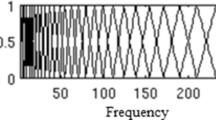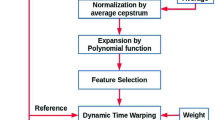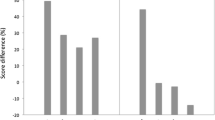Abstract
In recognition of high-quality wideband speech codecs, several standardization activities have been conducted, resulting in the selection of a wideband speech codec called adaptive multi-rate wideband (AMR-WB). The algebraic code-excited linear prediction (ACELP) technique is recommended in AMR-WB, and it is noted that most of the complexity in the ACELP structure comes from the codebook search. In this paper, a new method is proposed for codebook search based on the behavior of backward filtered target signal, d(n), introduced in ITU-T G.722.2 recommendation. To optimize the proposed scheme, five optimization algorithms (i.e., modified genetic algorithm, particle swarm optimization with dynamic inertia weight, bee colony optimization, modified differential evolution, and imperialist competition algorithm) are investigated. Experimental results show that the reduction in codebook search operations of the proposed method is able to reach up to 59 percent as compared with ITU-T G.722.2 recommendation. Meanwhile, BCO-based codebook search scheme has better convergence speed without significant degradation in quality metrics, such as segmental signal-to-noise ratio, mean opinion score, and perceptual evaluation of speech quality, when used in an AMR-WB speech codec.







Similar content being viewed by others
References
Third Generation Partnership Project (2005) 3GPP technical specification, 3GPP TS 26.190: adaptive multi-rate wideband speech transcoding, Valbonne
Telecommunication Standardization Sector of ITU (2002) Recommendation G.722.2: wideband coding of speech at around 16 kbit/s using adaptive multi-rate wideband (AMR-WB), Geneva
Fuentelsaz L, Pablo Maícas J, Polo Y (2008) The evolution of mobile communications in Europe: the transition from the second to the third generation. Telecommun Policy 32:436–449
Fijnvandraat M, Bouwman H (2006) Flexibility and broadband evolution. Telecommun Policy 30:424–444
Liang Y, Lee Y-C, Teng A (2007) Real-time communication: Internet protocol voice and video telephony and teleconferencing. In: Multimedia over IP and wireless networks, pp 503–525
Geller V (2011) Beyond powerful radio: audio communication across multiple delivery platforms: broadcasting, streaming, video, social media, podcasting, & beyond. In: Beyond powerful radio, 2nd edn, Focal Press, pp 315–340
Matijasevic M, Skorin-Kapov L (2003) Design and evaluation of a multi-user virtual audio chat. Futur Gener Comput Syst 19:229–239
Jara CA, Candelas FA, Torres F, Dormido S, Esquembre F, Reinoso O (2009) Real-time collaboration of virtual laboratories through the Internet. Comput Educ 52:126–140
Häyrinen K, Saranto K, Nykänen P (2008) Definition, structure, content, use and impacts of electronic health records: a review of the research literature. Int J Med Inf 77:291–304
Ogata H, Liu Y, Ochi Y, Yano Y (2001) Neclle: network-based communicative language-learning environment focusing on communicative gaps. Comput Educ 37:225–240
Hallett L, Hintz A (2010) Digital broadcasting-challenges and opportunities for European community radio broadcasters. Telemat Inf 27:151–161
3GPP Organizational Partners (2005) ARIB STD-T63-26.290 V6.2.0: extended adaptive multi-rate wideband (AMR-WB +) codec, Valbonne
Jelinek M, Salami R (2007) Wideband speech coding advances in VMR-WB standard. IEEE Trans Audio Speech Lang Process 15:1167–1179
Ha NK (1999) A Fast method of algebraic codebook search by reordering search sequence. In: The proceedings of international conference on acoustics, speech and signal processing, vol 1, pp 21–24
Ramirez MA, Gerken M (1999) A multistage search of algebraic CELP codebooks. In: The proceedings of international conference on acoustics, speech and signal processing, vol 1, pp 17–20
Ramirez MA, Gerken M (2000) Joint position and amplitude search of algebraic multipulses. IEEE Trans Speech Audio Process 8:633–637
Chen FK, Yang JF (2001) Maximum take precedence ACELP: a low complexity search method. In: The proceedings of international conference on acoustics, speech and signal processing, vol 2, pp 693–696
Chen FK, Yang JF, Yan YL (2002) Candidate scheme for fast ACELP search. IEE Proceed Vis Image Sig Process 149:10–16
Byun KJ, Jung HB, Hahn M, Kim KS (2002) A fast ACELP codebook search method. In: The proceedings of international conference on signal processing, vol 1, pp 422–425
Byun KJ, Jung HB, Hahn M, Kim KS (2003) Computationally efficient implementation of AMR speech coder. In: The proceedings of international symposium on image and signal processing and analysis, vol 1, pp 528–531
Byun KJ, Eo IS, Jeong HB, Hahn M (2006) Real-time implementation of AMR and AMR-WB using the fixed-point DSP for WCDMA systems. In: The proceedings of IEEE international symposium on consumer electronics, pp 1–6. doi:10.1109/ISCE.2006.1689492
Park H, Choi Y, Lee D (2002) Efficient codebook search method for ACELP speech codecs. In: IEEE workshop proceedings, pp 6–9
Lee ED, Lee MS, Kim DY (2003) Global pulse replacement method for fixed codebook search of ACELP speech codec. In: The proceedings of IASTED international conference on communications, internet and information technology, pp 372–375
Lee ED, Yun SH, Lee SI, Ahn JM (2007) Iteration-free pulse replacement method for algebraic codebook search. IEE Electron Lett 43:59–60
Tsai SM, Yang JF (2006) Efficient algebraic code-excited linear predictive codebook search. IEE Proceed Vis Image Sig Process 153:761–768
Halimi M, Kaddai A, Bengherabi M (2003) A new multistage search of algebraic CELP codebooks based on trellis coding. In: IEICE trans information systems, E86-D, pp 406–411
Kumar RP (2007) High computational performance in code excited linear prediction speech model using faster codebook search techniques. In: The proceedings of IEEE international conference on computing: theory and applications, pp 458–462
Falahati A, Soleimani M, Tabataba Vakili V (2008) Dynamic tree pruning method for fast ACELP search. In: The proceedings of international conference on information and communication technologies, pp 1–6
Li FL, Liu XW, Zhang XY, Du XL (2010) A fast VQ codeword search algorithm for AMR wideband speech codec. In: The proceedings of international conference on computer and automation engineering, pp 479–482
Sheikhan M, Garoucy S (2012) Substitution of G.728 vocoder’s codebook search module with SOM array trained by PSO-optimized supervised algorithm. Neural Computing and Applications (article in press). Published online 25 September 2012 doi:10.1007/s00521-012-1183-z
Sheikhan M, Garoucy S (2010) Reducing the codebook search time in G.728 speech coder using fuzzy ARTMAP neural networks. World Appl Sci J 8:1260–1266
Sheikhan M, Garoucy S (2010) Hybrid VQ and neural models for ISF quantization in wideband speech coding. World Appl Sci J 10 (Special Issue of Computer & Electrical Engineering):59–66
Goldberg DE (1989) Genetic algorithms in search, optimization and learning, 1st edn. Addison Wesley, Boston
Sridharan B (2010) Modifications in genetic algorithm using additional parameters to make them computationally efficient. In: The proceedings of IEEE international conference on advance computing, pp 55–59
Shah NA, Moffitt RA, Wang MD (2007) Modified genetic algorithm for parameter selection of compartmental models. In: The proceedings of conference of engineering in medicine and biology society, pp 143–146
Rani MR, Selamat H, Zamzuri H, Ibrahim Z (2012) Multi-objective optimization for PID controller tuning using the global ranking genetic algorithm. Int J Innov Comput Inf Control 8:269–284
Sheikhan M, Ghoreishi SA (2012) Antiviral therapy using a fuzzy controller optimized by modified evolutionary algorithms: a comparative study. Neural Comput Appl (article in press). Published online 15 September 2012, doi:10.1007/s00521-012-1146-4
Latif A, Naghsh-Nilchi AR (2012) Digital image watermarking based on parameters amelioration of parametric Slant-Hadamard transform using genetic algorithm. Int J Innov Comput Inf Control 8:1205–1220
Sheikhan M, Bagheri MM (2012) Robust state estimator design for uncertain linear systems using optimization techniques. Neural Comput Appl (article in press). Published online 26 July 2012, doi:10.1007/s00521-012-1089-9
Xhafa F, Carretero J, Abraham A (2007) Genetic algorithm based schedulers for grid computing systems. Int J Innov Comput Inf Control 3:1053–1071
Sheikhan M, Movaghar B (2009) Exchange rate prediction using an evolutionary connectionist model. World Appl Sci J 7 (Special Issue of Computer & IT):8–16
Gharavian D, Sheikhan M, Nazerieh AR, Garoucy S (2011) Speech emotion recognition using FCBF feature selection method and GA-optimized fuzzy ARTMAP neural network. Neural Comput Appl (article in press). Published online 27 May 2011, doi:10.1007/s00521-011-0643-1
Wang CL, Hong TP, Horng G, Wang WH (2009) A GA-based key-management scheme in hierarchical wireless sensor networks. Int J Innov Comput Inf Control 5:4693–4702
Tan TH, Huang YF, Liu FT (2010) Multi-user detection in DS-CDMA systems using a genetic algorithm with redundancy saving strategy. Int J Innov Comput Inf Control 6:3347–3364
Kennedy J, Eberhart RC (1995) Particle swarm optimization. In: The proceedings of IEEE international conference on neural networks, vol 4, pp 1942–1948
Chen X, Li Y (2007) A modified PSO structure resulting in high exploration ability with convergence guaranteed. IEEE Trans Syst Man Cybernet Part B Cybernet 37:1271–1289
Zeng G, Jiang Y (2010) A modified PSO algorithm with line search. In: The proceedings of international conference on computational intelligence and software engineering, pp 1–4, doi:10.1109/CISE.2010.5677031
Lai CC, Wu CH, Tsai MC (2009) Feature selection using particle swarm optimization with application in spam filtering. Int J Innov Comput Inf Control 5:423–432
Sheikhan M, Pezhmanpour M, Moin MS (2012) Improved contourlet-based steganalysis using binary particle swarm optimization and radial basis neural networks. Neural Comput Appl 21:1717–1728
Kuo RJ, Lin FJ (2010) Application of particle swarm optimization-based clustering method to reduce SMT setup time for industrial PC manufacturer in Taiwan. Int J Innov Comput Inf Control 6:3381–3400
Sheikhan M, Shahnazi R, Nooshad Yousefi A (2012) An optimal fuzzy PI controller to capture the maximum power for variable-speed wind turbines. Neural Comput Appl (article in press). Published online 25 July 2012, doi:10.1007/s00521-012-1081-4
Karakuzu C (2010) Parameter tuning of fuzzy sliding mode controller using particle swarm optimization. Int J Innov Comput Inf Control 6:4755–4770
Siddiqui AB, Jaffar MA, Hussain A, Mirza AM (2011) Block-based pixel level multi-focus image fusion using particle swarm optimization. Int J Innov Comput Inf Control 7:3583–3596
Esmin AAA, Lambert-Torres G (2012) Application of particle swarm optimization to optimal power systems. Int J Innov Comput Inf Control 8:1705–1716
Gao Y, Li Y, Qian H (2008) The design of IIR digital filter based on chaos particle swarm optimization algorithm. In: The proceedings of IEEE international conference on genetic and evolutionary computing, pp 303–306
Hsu CH (2011) Optimizing MIMO-SDMA smart antennas by using linear array phase perturbations based on particle swarm optimization. Int J Innov Comput Inf Control 7:1331–1340
Sheikhan M, Mohammadi N (2012) Time series prediction using PSO-optimized neural network and hybrid feature selection algorithm for IEEE load data. Neural Comput Appl (article in press). Published online 7 June 2012, doi:10.1007/s00521-012-0980-8
Sheikhan M, Pardis R, Gharavian D (2012) State of charge neural computational models for high energy density batteries in electric vehicles. Neural Comput Appl (article in press). Published online 17 February 2012, doi:10.1007/s00521-012-0883-8
Sheikhan M, Hemmati E (2012) PSO-optimized Hopfield neural network-based multipath routing for mobile ad-hoc networks. Int J Comput Intell Syst 5:568–581
Sheikhan M, Sha’bani AA (2012) PSO-optimized modular neural network trained by OWO-HWO algorithm for fault location in analog circuits. Neural Comput Appl (article in press). Published online 25 April 2012, doi:10.1007/s00521-012-0947-9
Sheikhan M, Shahnazi R, Garoucy S (2011) Synchronization of general chaotic systems using neural controllers with application to secure communication. Neural Comput Appl (article in press). Published online 19 July 2011, doi:10.1007/s00521-011-0697-0
Sheikhan M, Shahnazi R, Hemmati E (2012) Adaptive active queue management controller for TCP communication networks using PSO-RBF models. Neural Comput Appl (article in press). Published online 4 January 2012, doi:10.1007/s00521-011-0786-0
Sheikhan M, Shahnazi R, Garoucy S (2011) Hyperchaos synchronization using PSO-optimized RBF-based controllers to improve security of communication systems. Neural Computing and Applications (article in press). Published online 16 December 2011. doi:10.1007/s00521-011-0774-4
Alfi A (2012) Particle swarm optimization algorithm with dynamic inertia weight for online parameter identification applied to Lorenz chaotic system. Int J Innov Comput Inf Control 8:1191–1204
Bonabeau E, Dorigo M, Theraulaz G (1999) Swarm intelligence: from natural to artificial systems, 1st edn. Oxford University Press, Oxford
Akay B, Karaboga D (2012) A modified artificial bee colony algorithm for real-parameter optimization. Inf Sci 192:120–142
Suriya S, Deepalakshmi R, Suresh Kannan S, Shantharajah SP (2012) Enhanced bee colony algorithm for complex optimization problems. Int J Comput Sci Eng 4:72–78
Jiann-Horng L, Li-Ren H (2009) Chaotic bee swarm optimization algorithm for path planning of mobile robots. In: The proceedings of WSEAS international conference on evolutionary computing, pp 84–89
Quijano N, Passino KM (2007) Honey bee social foraging algorithms for resource allocation, part I: algorithm and theory. In: The proceedings of American control conference, pp 3383–3388
Idris RM, Khairuddin A, Mustafa MW (2010) Optimal allocation of FACTS devices in deregulated electricity market using bees algorithm. WSEAS Trans Power Syst 5:108–119
Storn R, Price K (1997) Differential evolution: a simple and efficient heuristic for global optimization over continuous spaces. J Glob Optim 11:341–359
Mandal A, Das AK, Mukherjee P, Das S, Suganthan PN (2011) Modified differential evolution with local search algorithm for real world optimization. In: The proceedings of IEEE congress on evolutionary computation, pp 1565–1572
Ali M, Pant M, Singh VP (2010) Two modified differential evolution algorithms and their applications to engineering design problems. World J Model Simul 6:72–80
Takahama T, Sakai S, Hara A, Iwane N (2009) Predicting stock price using neural networks optimized by differential evolution with degeneration. Int J Innov Comput Inf Control 5:5021–5031
Xu J, Zhang J (2011) Differential evolution algorithm based on uniform design for multiobjective optimization problems. ICIC Express Lett 5:3381–3388
Atashpaz-Gargari E, Lucas C (2007) Imperialist competitive algorithm: An algorithm for optimization inspired by imperialistic competition. In: The proceedings of IEEE congress on evolutionary computation, pp 4661–4667
Niknam T, Taherian Fard E, Pourjafarian N, Rousta A (2011) An efficient hybrid algorithm based on modified imperialist competitive algorithm and K-means for data clustering. Eng Appl Artif Intell 24:306–317
Ebrahimzadeh A, Addeh J, Rahmani Z (2012) Control chart pattern recognition using K-MICA clustering and neural networks. ISA Trans 51:111–119
Atashpaz-Gargari E, Rajabioun R, Hashemzadeh F, Salmasi FR (2009) A decentralized PID controller based on optimal shrinkage of Gershgorin bands and PID tuning using colonial competitive algorithm. Int J Innov Comput Inf Control 5:3227–3240
Rashid M, Rauf Baig A (2010) PSOGP: a genetic programming based adaptable evolutionary hybrid particle swarm optimization. Int J Innov Comput Inf Control 6:287–298
Song H, Lee B (2011) Identification of dynamic load model parameters using a hybrid PSO-simplex method. ICIC Express Lett 5:4021–4026
Lin CJ, Wang JG, Chen SM (2011) 2D/3D face recognition using neural network based on hybrid Taguchi-particle swarm optimization. Int J Innov Comput Inf Control 7:537–554
Shih KS, Li THS, Tsai SH (2012) Observer-based adaptive fuzzy robust controller with self-adjusted membership functions for a class of uncertain MIMO nonlinear systems: a PSO-SA method. Int J Innov Comput Inf Control 8:1419–1438
Bahmani Firouzi B, Sha Sadeghi M, Niknam T (2010) A new hybrid algorithm based on PSO, SA, and K-means for cluster analysis. Int J Innov Comput Inf Control 6:3177–3192
Jabeen H, Rauf Baig A (2012) GPSO: a framework for optimization of genetic programming classifier expressions for binary classification using particle swarm optimization. Int J Innov Comput Inf Control 8:233–242
Bistritz Y, Pellerm S (1993) Immittance spectral pairs (ISP) for speech encoding. In: The proceedings of international conference on acoustics, speech and signal processing, vol 2, pp 9–12
Roeva O (2006) A modified genetic algorithm for a parameter identification of fermentation processes. Biotechnol Biotechnol Equip 20:202–209
Shi Y, Eberhart R (1998) Parameter selection in particle swarm optimization. In: The proceedings of international conference on evolutionary programming, pp 591–601
Engelbrecht AP (2007) Computational intelligence-an introduction, 2nd edn. Wiley, England, pp 289–357
Suganthan PN (1999) Particle swarm optimiser with neighborhood operator. In: The proceedings of IEEE congress on evolutionary computation, pp 1958–1962
Yoshida H, Fukuyama Y, Takayama S, Nakanishi Y (1999) A particle swarm optimization for reactive power and voltage control in electric power systems considering voltage security assessment. In: The proceedings of IEEE international conference on systems, man, and cybernetics, vol 6, pp 497–502
Naka S, Genji T, Yura T, Fukuyama Y (2001) Practical distribution state estimation using hybrid particle swarm optimization. In: The proceedings of IEEE power engineering society winter meeting, vol 2, pp 815–820
Ratnaweera A, Halgamuge S, Watson H (2003) Particle swarm optimization with self-adaptive acceleration coefficients. In: The proceedings of international conference on fuzzy systems and knowledge discovery, pp 264–268
Brajevic I, Tuba M, Subotic M (2011) Performance of the improved artificial bee colony algorithm on standard engineering constrained problems. Int J Math Comput Simul 5:135–143
Back T, Hoffmeister F, Schwefel H (1991) A survey of evolution strategies. In: The proceedings of international conference on genetic algorithms and their applications, pp 2–9
Fogel L (1994) Evolutionary programming in perspective: the top-down view. In: Zurada JM, Marks RJ, Robinson C (eds) Computational intelligence: imitating life. IEEE Press, Piscataway
Kaelo P, Ali MM (2006) A numerical study of some modified differential evolution algorithms. Eur J Oper Res 169:1176–1184
Pant M, Ali M, Singh VP (2008) Differential evolution with parent centric crossover. In: The proceedings of second UKSIM European symposium on computer modeling and simulation, pp 141–146
Rahnamayan S, Tizhoosh HR, Salama MMA, Opposition based differential evolution. IEEE Trans Evol Comput 12:1–16
Fan HY, Lampinen J (2003) A trigonometric mutation operation to differential evolution. J Glob Optim 27:105–129
Bergey PK, Ragsdale C (2005) Modified differential evolution: a greedy random strategy for genetic recombination. Omega 33:255–265
Yang Z, He J, Yao X (2007) Making a difference to differential evolution. In: Siarry P, Michalewicz Z (eds) Advances in metaheuristics for hard optimization. Springer, Berlin, pp 415–432
Ali MM (2007) Differential evolution with preferential crossover. Eur J Oper Res 181:1137–1147
Salman A, Engelbrecht AP, Omran MGH (2007) Empirical analysis of self adaptive differential evolution. Eur J Oper Res 183:785–804
Deller JR, Hansen JHL, Proakis JG (2000) Discrete-time processing of speech signals, 2nd edn. IEEE Press, New York
Telecommunication Standardization Sector of ITU (1996) Recommendation P.830: subjective performance assessment of telephone-band and wideband digital codecs, Geneva
Telecommunication Standardization Sector of ITU (2001) Recommendation P.862: perceptual evaluation of speech quality (PESQ), an objective method for end-to-end speech quality assessment of narrow-band telephone networks and speech codecs, Geneva
Bijankhan M, Sheikhzadegan J, Roohani MR, Smareh Y, Lucas C, Tebiani M (1994) The speech database of Farsi spoken language. In: The proceedings of Australian conference on speech science and technology, pp 826–831
Author information
Authors and Affiliations
Corresponding author
Rights and permissions
About this article
Cite this article
Sheikhan, M. Modification of codebook search in adaptive multi-rate wideband speech codecs using intelligent optimization algorithms. Neural Comput & Applic 24, 911–926 (2014). https://doi.org/10.1007/s00521-012-1321-7
Received:
Accepted:
Published:
Issue Date:
DOI: https://doi.org/10.1007/s00521-012-1321-7




